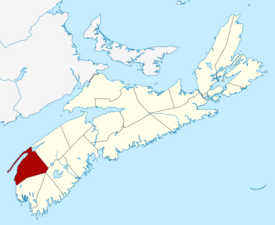Digby County, Nova Scotia
Digby County
Comté de Digby (French) | |
|---|---|
 Location of Digby County, Nova Scotia | |
| Coordinates: 44°18′N 65°48′W / 44.3°N 65.8°W | |
| Country | Canada |
| Province | Nova Scotia |
| District municipalities | Clare / Digby |
| Towns | Digby |
| Established | 1837 |
| Divided into District Municipalities | April 17, 1879 |
| Electoral Districts Federal | West Nova |
| Provincial | Digby-Annapolis / Clare |
| Area | |
| • Land | 2,512.28 km2 (970.00 sq mi) |
| Population | |
| • Total | 17,062 |
| • Density | 6.8/km2 (18/sq mi) |
| • Change 2011-16 | |
| • Census Rankings - District municipalities Clare Digby - Towns Digby - Reserves Bear River 6 | 8,813 (431 of 5,008) 7,986 (458 of 5,008) 2,092 (2,074 of 5,008) 101 (4,415 of 5,008) |
| Time zone | UTC-4 (AST) |
| • Summer (DST) | UTC-3 (ADT) |
| Area code | 902 |
| Dwellings | 9927 |
| Median income* | CA$38,284 |
| |
Digby County is a county in the Canadian province of Nova Scotia.
History
[edit]It was named after the Township of Digby; this was named in honour of Rear Admiral Robert Digby, who dispatched HMS Atalanta to convey Loyalists from New York City in the spring of 1783 to Conway, which became known as Digby, as part of their evacuation and resettlement following the American Revolutionary War. The Crown resettled thousands of Loyalists in Nova Scotia and other areas of Canada. Digby County was established in 1837. Previously, from August 17, 1759, when Nova Scotia was first divided into counties, this area had been part of Annapolis County.
In 1861, Digby County was divided into two sessional districts: Digby and Clare. These were eventually incorporated as district municipalities in 1879.
In addition to these two district municipalities, the county contains the Town of Digby and part of the Bear River Indian (First Nations) reserve. Also, there is Digby Neck leading into the Bay of Fundy to Long Island and Brier Island.
Demographics
[edit]As a census division in the 2021 Census of Population conducted by Statistics Canada, Digby County had a population of 17,062 living in 8,117 of its 9,681 total private dwellings, a change of -1.5% from its 2016 population of 17,323. With a land area of 2,512.28 km2 (970.00 sq mi), it had a population density of 6.8/km2 (17.6/sq mi) in 2021.[3]
|
Mother tongue language (2011)[6]
|
Ethnic groups (2006)[7]
|
Communities
[edit]- Towns
- Villages
- Reserves
- District municipalities
Access routes
[edit]Highways and numbered routes that run through the county, including external routes that start or finish at the county boundary:[8]
|
|
|
Museums
[edit]The county's history is preserved at the Admiral Digby Museum as well as several community museums.
Notable people
[edit]- Elsie Charles Basque
- Coline Campbell
- Joseph Willie Comeau
- Phil Comeau
- Alfred Gilpin Jones
- Herbert Ladd Jones
- William M. Jones
- Sam Langford
- John Elkanah Morton
- George Nowlan
- Henri M. Robicheau
- Adam Smith
- Pop Smith
- Robert Thibault
- Martin Welch
- Maud Lewis
See also
[edit]References
[edit]- ^ a b "2021 Statistics Canada Community Profile: Digby County, Nova Scotia". Archived from the original on 2011-07-06. Retrieved 2022-06-08.
- ^ "Search results for 'Digby'" Population and dwelling counts, for Canada and census subdivisions (municipalities), 2006 and 2001 censuses - 100% data
- ^ "Population and dwelling counts: Canada and census divisions". Statistics Canada. February 9, 2022. Retrieved April 2, 2022.
- ^ Censuses 1871-1941
- ^ Statistics Canada: 1996, 2001, 2006 census
- ^ Statistics Canada: 2011 census
- ^ 2006 Statistics Canada Census Ethnocultural Portrait of Canada: Digby County, Nova Scotia
- ^ Atlantic Canada Back Road Atlas ISBN 978-1-55368-618-7 Pages 76-77, 84-85
